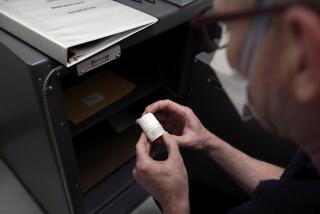Wars of ‘Expert Witnesses’ May Be Headed for a Truce
- Share via
Since 1858, when the Supreme Court observed that judges and jurors can easily be perplexed by the “opposite opinions of persons professing to be experts,” legal scholars have searched for better ways to assess highly technical evidence in trials with a scientific twist.
The flood of so-called mass tort cases in recent decades has only made the problem worse. These cases now number in the hundreds of thousands and involve injury claims resulting from the use of or exposure to all kinds of products, from asbestos to pharmaceuticals and medical devices. Claims filed within the past month against the makers of the popular diet combination fen-phen, alleging the drugs cause heart valve problems, are just the most recent examples.
Each of these mass torts presents two complex questions: whether the product can theoretically cause injury and whether it caused the injuries claimed by the individual plaintiffs. Lay jurors and judges have struggled with these questions--and often reached very different conclusions. Only now has the federal government actively begun to experiment with an alternative: the “national science panel.” In the first use of such a panel, four scientists are advising U.S. District Judge Sam C. Pointer on whether silicone-gel-filled breast implants can cause disease. Seeking an alternative to highly paid professional witnesses confusing jurors by presenting opinions as fact, Pointer has chosen a relatively neutral panel of acclaimed scientists and asked them to carefully assess the evidence outside the adversarial heat of a courtroom.
As with any expert testimony, the panel’s conclusion will be introduced in Pointer’s court and accepted or rejected by ordinary jurors. But the panel is unique because it represents the nation’s first attempt to develop a prototype for assessing scientific evidence in highly technical trials.
The panel’s formation by a government research agency, the Federal Judicial Center, was prompted by the multibillion-dollar lawsuits brought against Dow Corning and other breast implant manufacturers in the mid-1990s. Dr. Marcia Angell, executive editor of the New England Journal of Medicine and author of a recent book on the breast implant cases, reflects the concern of many observers that such jury verdicts have been based less on scientific evidence than on personal leanings like sympathy for plaintiffs and antipathy toward corporate defendants. Angell suggests eliminating juries altogether in medical liability and other tort cases, replacing them with panels of experts approved by scientific peer-review committees. The panels would present their evidence directly to the trial judge.
Such an approach, however, would clearly undermine Americans’ constitutional right to a verdict by “a jury of one’s peers.” It also would buy into the misconception that there is such a thing as a truly neutral scientist. Even the best scientists may have agendas of their own, like defending the theories that have won them research dollars.
A more sensible and feasible reform would give federal judges training in specialized fields and assign them cases on the basis of their areas of expertise. The idea has been proposed both by scientists in the American Assn. for the Advancement of Science and by legal scholars in the American Bar Assn. The proposal deserves implementation by the Federal Judicial Center on an experimental basis.
Trials have become increasingly challenging because of the technical nature of forensic science. But at their heart remain the essential questions of right and wrong. And to these questions, at least, scientists have no better answers than the rest of us.






